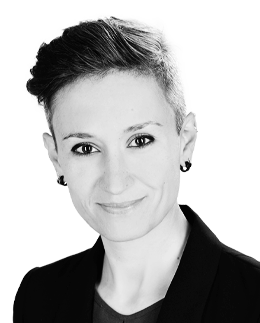Prof. Dr. Sandra Buchholz studied Sociology at Bielefeld University. She successfully completed her Ph.D. in 2008 and her postdoc qualification (Habilitation) in 2016, both at Bamberg University. From 2012 to 2017, she held a temporary appointment as Professor of Sociology in Bamberg. From 2017 to 2018, Sandra Buchholz has been interim Director of the Leibniz Institute for Educational Trajectories and Professor for Longitudinal Educational Research in Bamberg. In 2018, she joined DZHW as Head of the Research Area “Educational Careers and Graduate Employment”. Additionally, Sandra Buchholz holds the W3-Professorship "Quantitative Life Course Sociology" at Hanover University.

Prof. Dr. Sandra Buchholz
Research Area Educational Careers and Graduate Employment
Head of Department
- +49 511 450670-176
- +49 511 450670-960
- Orcid
Academic research fields
Educational research; life course research; social inequalities; social mobility and stratification; international comparative social structure analysis; labour market research; young people and their entry into the labour market; old age, entering retirement and retirement; wealth inequalities; gender-specific employment histories and family processes; comparison of welfare states, labour market regimes and educational systems; quantitative research methods (esp. longitudinal analysis methods)
List of projects
List of publications
7: Tenure track career options to full professorship in German academia: recent developments and challenges.Schwabe, U., Peter, F., & Buchholz, S. (2024).7: Tenure track career options to full professorship in German academia: recent developments and challenges. In E. Pekkola & T. Siekkinen (Hrsg.), Tenure Tracks in European Universities (S. 116-135). Cheltenham, UK: Edward Elgar Publishing. https://doi.org/10.4337/9781035302451.00013 |
Neuer Bildungstrichter: Trotz Akademisierungsschub immer noch ungleicher Zugang zur Hochschule.Kracke, N., Schwabe, U., & Buchholz, S. (2024).Neuer Bildungstrichter: Trotz Akademisierungsschub immer noch ungleicher Zugang zur Hochschule. (DZHW Brief 02|2024). Hannover: DZHW. https://doi.org/10.34878/2024.02.dzhw_brief |
Bildung in Deutschland 2024. Ein indikatorengestützter Bericht mit einer Analyse zu beruflicher Bildung.Autor:innengruppe Bildungsberichterstattung (Hrsg.) - DZHW-Autor:innen: Buchholz, S. & Kerst, C. (2024).Bildung in Deutschland 2024. Ein indikatorengestützter Bericht mit einer Analyse zu beruflicher Bildung. Bielefeld: wbv. |
Does gender composition in a field of study matter? Gender disparities in college students’ academic self-concepts.Fiedler, I., Buchholz, S., & Schaeper, H. (2024).Does gender composition in a field of study matter? Gender disparities in college students’ academic self-concepts. Research in Higher Education (online first). https://doi.org/10.1007/s11162-024-09794-7 |
Die Studierendenbefragung in Deutschland: best3.
Die Studierendenbefragung in Deutschland: best3. Studieren mit einer gesundheitlichen Beeinträchtigung. Hannover: DZHW. |
Die Studierendenbefragung in Deutschland: 22. Sozialerhebung.
Die Studierendenbefragung in Deutschland: 22. Sozialerhebung. Die wirtschaftliche und soziale Lage der Studierenden in Deutschland 2021. Berlin: Bundesministerium für Bildung und Forschung. |
Von direkten und alternativen Wegen ins Studium: Eine quantitative Analyse zum sozialen Phänomen der beruflich-akademischen Doppelqualifizierung von Studienberechtigten.Ordemann, J., Buchholz, S., & Spangenberg, H. (2023).Von direkten und alternativen Wegen ins Studium: Eine quantitative Analyse zum sozialen Phänomen der beruflich-akademischen Doppelqualifizierung von Studienberechtigten. In J. Ordemann, F. Peter, & S. Buchholz (Hrsg.), Vielfalt von hochschulischen Bildungsverläufen (S. 47-77). Wiesbaden: Springer. https://doi.org/10.1007/978-3-658-39657-2_3 Abstract
This paper focuses on dual qualifications (vocational and academic) and on how they affect social disparities in the probability of going to university. We analyze data from the DZHW Panel Study of School Leavers with a Higher Education Entrance Qualification 2012 to assess whether students find their way into academia via alternative pathways (vocational training) and whether this reduces existing social disparities in their likelihood of studying. This approach allows us to look at the educational pathways and detours to higher education over a more extended time than has been done in earlier studies and to highlight the effect of the timing of vocational training. On the one hand, our results confirm earlier findings ... |
Vielfalt von hochschulischen Bildungsverläufen – neue Aspekte, Erkenntnisse und Entwicklungen.Ordemann, J., Peter, F., & Buchholz, S. (2023).Vielfalt von hochschulischen Bildungsverläufen – neue Aspekte, Erkenntnisse und Entwicklungen. In J. Ordemann, F. Peter, & S. Buchholz (Hrsg.), Vielfalt von hochschulischen Bildungsverläufen (S. 1-20). Wiesbaden: Springer (online first). https://doi.org/10.1007/978-3-658-39657-2_1 Abstract
Educational and employment careers do not always follow a straight line, as the nine chapters of this volume demonstrate. The chapters cover various topics related to access to higher education and transition to the labour market. They address the direct and indirect pathways to higher education, the potential complexity of the decision-making involved, and possible returns to the multiple educational pathways. The variety of educational trajectories, the focus of the volume, has gained importance in empirical educational research, not least because there are now rich longitudinal data sets such as the DZHW Panel Study of School Leavers or the National Education Panel (NEPS). Only by monitoring individuals over an extended period ... |
Vielfalt von hochschulischen Bildungsverläufen.Ordemann, J., Peter, F., & Buchholz, S. (Hrsg.) (2023).Vielfalt von hochschulischen Bildungsverläufen.Wege in das, durch das und nach dem Studium. Wiesbaden: Springer (online first). https://doi.org/10.1007/978-3-658-39657-2 Abstract
Individual educational and life paths are far more diverse today than is often assumed. Many paths with and without a university entrance qualification lead to higher education at different points in time. Diversity persists in higher education and beyond. Students have different backgrounds, change their course of study, interrupt their studies, or drop out. The current findings in this anthology impressively explore this diversity, from the paths to a degree program to the labor market. |
Atypische Bildungsverläufe: Warum studieren Studienberechtigte aus weniger privilegierten Familien immer noch seltener?Quast, H., Mentges, H., & Buchholz, S. (2023).Atypische Bildungsverläufe: Warum studieren Studienberechtigte aus weniger privilegierten Familien immer noch seltener? In J. Ordemann, F. Peter, & S. Buchholz (Hrsg.), Vielfalt von hochschulischen Bildungsverläufen (S. 79-106). Wiesbaden: Springer (online first). https://doi.org/10.1007/978-3-658-39657-2_4 Abstract
Despite reform efforts in education policy, social inequalities in the transition to tertiary education still persist in Germany. Following Boudon’s (1974) distinction between primary and secondary effects of social origin, various studies have addressed the question to what extent these effects contribute to social inequality, but they usually only approximate the explanatory contribution of secondary effects. By estimating a decomposition analysis based on a current data set from the German Panel Study of School Leavers, we are able to examine the extent to which primary and secondary origin effects, and especially their individual components, explain social inequalities in the decision to enrol. It turns out that differences ... |
Die Studierendenbefragung in Deutschland: Eine neue, integrierte Datenbasis für Forschung, Bildungs-und Hochschulpolitik.Beuße, M., Kroher, M., Becker, K., Ehrhardt, M.-C., Isleib, S., ... & Strauß, S. (2022).Die Studierendenbefragung in Deutschland: Eine neue, integrierte Datenbasis für Forschung, Bildungs-und Hochschulpolitik. (DZHW Brief 06|2022). Hannover: DZHW. https://doi.org/10.34878/2022.06.dzhw_brief |
Bildung in Deutschland 2022. Ein indikatorengestützter Bericht mit einer Analyse zum Bildungspersonal.Autorengruppe Bildungsberichterstattung (Hrsg.) - DZHW-Autor*innen: Buchholz, S., & Kerst. C. (2022).Bildung in Deutschland 2022. Ein indikatorengestützter Bericht mit einer Analyse zum Bildungspersonal. Bielefeld: wbv. |
List of presentations & conferences
Successful career paths to full professorship - A typology and analysis of influencing factors.Kizilirmak, J. M., Buchholz, S., & Peter, F. (2024, September).Successful career paths to full professorship - A typology and analysis of influencing factors. Vortrag auf der Konferenz Adressing inequalities in incomplete revolutions, European Consortium for Sociological Research, Barcelona, Spanien. |
The Importance of Personality for Low SES High School Graduates’ Transition to Higher Education.Nika, D., Grüttner, M., & Buchholz, S. (2024, September).The Importance of Personality for Low SES High School Graduates’ Transition to Higher Education. Vortrag auf der Konferenz CHER 36th Annual Conference, University of Luxembourg, Campus Belval, Luxemburg. |
Die Rolle von Persönlichkeitseigenschaften für die Studienintention von Studienberechtigten aus unterschiedlicher sozialer Herkunft.Nika, D., Grüttner, M., & Buchholz, S. (2024, März).Die Rolle von Persönlichkeitseigenschaften für die Studienintention von Studienberechtigten aus unterschiedlicher sozialer Herkunft. Vortrag auf der Tagung 11. Tagung der Gesellschaft für Empirische Bildungsforschung (GEBF), Universität Potsdam. |
The role of personality traits in high school graduates intention to enroll in higher education - resource substitution, structural amplification or cumulative advantage?Nika, D., Grüttner, M., & Buchholz, S. (2023, November).The role of personality traits in high school graduates intention to enroll in higher education - resource substitution, structural amplification or cumulative advantage? Vortrag auf der Konferenz LIVES International Conference, Lausanne, Schweiz. |
Ethnic Effects at the Transition to Higher Education in Germany. A Differentiated Analysis of the Impact of School Performance and Social Origin.Mentges, H., Sudheimer, S., & Buchholz, S. (2023, November).Ethnic Effects at the Transition to Higher Education in Germany. A Differentiated Analysis of the Impact of School Performance and Social Origin. Vortrag auf dem Workshop Hochschule in der (Post-)Migrationsgesellschaft: Zugang, Partizipation und Erfolg, DZHW. |
High School Grades, Non-Cognitive Capabilities and Social Inequality in Higher Education Enrolment.Grüttner, M., Peter, F., & Buchholz, S. (2023, Oktober).High School Grades, Non-Cognitive Capabilities and Social Inequality in Higher Education Enrolment. Vortrag auf der Konferenz 2023 SLLS Annual Conference, Life Courses in Times of Uncertainty, Society for Life Course and Longitudinal Studies, München. |
Career paths to professorship in Germany: A classification and description of critical factors.Kizilirmak, Jasmin M. (2023, Oktober).Career paths to professorship in Germany: A classification and description of critical factors. In J. Ordemann & K. Briedis (Vorsitz), Research in Higher Education in Germany: A Symposium on Longitudinal Studies in the Perspective of Institutional Contexts and Reforms. auf der Tagung SLLS Annual Conference: Life Courses in Times of Uncertainty, Munich, Germany. |
Intragenerational Occupational Mobility in Light of Intergenerational Educational Mobility, Women and Men, Germany.Ordemann, J., & Buchholz, S. (2023, September).Intragenerational Occupational Mobility in Light of Intergenerational Educational Mobility, Women and Men, Germany. Vortrag auf der Konferenz ECSR Annual Conference 2023, Insitute of Sociology of the Czech Academy of Sciences, Prag, Czech Republic. |
Soziale Selektivität beim Hochschulzugang: Alles beim Alten?Kracke, N., Schwabe, U., & Buchholz, S. (2023, September).Soziale Selektivität beim Hochschulzugang: Alles beim Alten? Vortrag im Rahmen der BMBF-Tagung "Vielfalt und Chancengerechtigkeit in Studium und Wissenschaft - bekannte Fragen, bessere Antworten, bewährte Praxisansätze", Bundesministerium für Bildung und Forschung (BMBF), Berlin. |
Intragenerational occupational mobility in light of intergenerational educational mobility.Ordemann, J., & Buchholz, S. (2023, August).Intragenerational occupational mobility in light of intergenerational educational mobility. Vortrag auf der Konferenz Knowledge Society (AS23), Universität Bern, Akademie der Soziologie, Bern, Schweiz. |
Intragenerational occupational mobility in the context of educational expansion: The German case.Ordemann, J., & Buchholz, S. (2023, August).Intragenerational occupational mobility in the context of educational expansion: The German case. Vortrag auf der Konferenz 118th Annual Meeting: The Educative Power of Sociology, American Sociological Association, Philadelphia, USA. |
Intragenerational occupational mobility in the light of intergenerational educational mobility of women and men, Germany.Ordemann, J., & Buchholz, S. (2023, August).Intragenerational occupational mobility in the light of intergenerational educational mobility of women and men, Germany. Vortrag auf der Konferenz RC28 Summer Meeting, Stone Center for Inequality Dynamics, University of Michigan, Berlin, USA. |
Wege zur Hochschulreife und ins Studium - Vielfältiger als gedacht! Ein Blick über den Tellerrand mit Längsschnittdaten.Buchholz, S. (2023, Juni).Wege zur Hochschulreife und ins Studium - Vielfältiger als gedacht! Ein Blick über den Tellerrand mit Längsschnittdaten. Vortrag im Rahmen der Veranstaltung "Das Nationale Bildungspanel (NEPS) - Befunde zu Übergängen ins und im deutschen Bildungssystem" mit den 16 Landesvertretern der Bildungsministerien, Institut für Bildungsmonitoring und Qualitätsentwicklung (IfBQ), Hamburg. |
Post secondary decision sooner or later? Social Inequality and Individual Capabilities in the Decision to Take a " Gap Year " after High School Graduation.Grüttner, M., Peter, F., & Buchholz, S. (2022, November).Post secondary decision sooner or later? Social Inequality and Individual Capabilities in the Decision to Take a "Gap Year" after High School Graduation. Vortrag auf der Konferenz CIDER-LERN Conference, Universität Luxemburg, Esch an der Alzette, Luxemburg. |
Professional career
Jan. 2023
Seat on the Board of Trustees of the Federal Institute for Population Research (BiB)
Since June 2021
Co-Editor of the Journal for Labour Market Research
Oct. 2020
Appointed as Member of the LCSS Leibniz Center for Science and Society
Feb. 2020
Appointed as Member of the scientific advisory board of the German Federal Institute for Vocational Education and Training [Bundesinstitut für Berufsbildung (BIBB)]
Sept. 2019
Appointment as LIfBi Research Affiliate, Leibniz-Institute for Educational Trajectories
Since August 2018
Member of the Educational Report author group
April 2018
Appointment as Research Fellow, Leibniz Center for Science and Society
Since April 2018
Head of the Research Area 'Educational Careers and Graduate Employment' at the German Centre for Higher Education Research and Science Studies (DZHW) and W3 Professor for Quantitative Life Course Sociology at Leibniz University Hanover
April 2017 - March 2018
Interim Director of the Leibniz-Institute for Educational Careers (LlfBi) and W3 Professorship for Longitudinal Educational Research at Bamberg University
Since Sept. 2012
Member of the National Educational Panel Study
Sept. 2012 - March 2017
Professor of Sociology, University of Bamberg
March 2007 - Aug. 2012
Senior Researcher, University of Bamberg
April 2003 - Feb. 2007
Junior Researcher in various international comparative research projects, University of Bamberg
Education and academic degrees
Jan. 2017
Venia Legendi in Sociology, University of Bamberg
Nov. 2016
Habilitation in Sociology, Faculty of Social Sciences, Economics and Business Administration, University of Bamberg
April 2003 - April 2008
PhD in Sociology (Dr. rer. pol.), Faculty of Social Sciences, Economics and Business Administration, University of Bamberg
Summa cum laude
Oct. 1998 - March 2003
Diploma Studies in Sociology (with minors in Social Psychology), University of Bielefeld


























